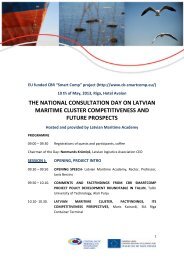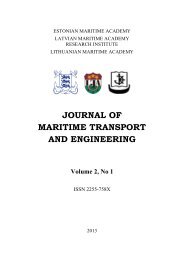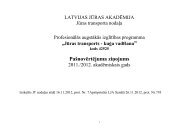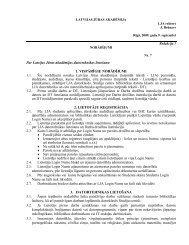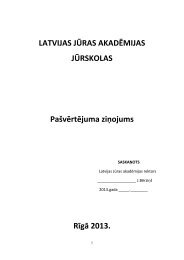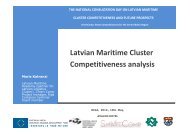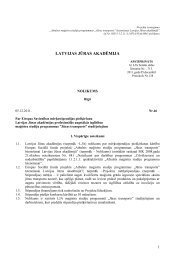14. starptautiskÄ konference 2012 - Latvijas JÅ«ras akadÄmija
14. starptautiskÄ konference 2012 - Latvijas JÅ«ras akadÄmija
14. starptautiskÄ konference 2012 - Latvijas JÅ«ras akadÄmija
You also want an ePaper? Increase the reach of your titles
YUMPU automatically turns print PDFs into web optimized ePapers that Google loves.
Proceedings of 14th International conference „Maritime Transport and Infrastructure - <strong>2012</strong>”THE AGE OF THE ELECTRO-TECHNICAL OFFICER IS HERE!Gary HindmarchSouth Tyneside College, UKAbstractThe training programmes that create competent seafarers is a combination of the development ofknowledge and demonstration of skills. The content of each training programme is devised to meet theneeds of the industry, whilst complying with any external certification required. This training profilehas been undertaken by Deck and Engineering Officers for many years.However as the maritime industry evolves, and new technology based operations expand, theseoperational demands have created the need for specialists who can operate and maintain theincreasingly complex systems and challenges that are faced by all mariners today.The myriad of electronics devices onboard has always required a specialist role and this wasundertaken by the Radio Officers, whose roles expanded from pure communications into maintainingthe array of bridge equipment. When the role of Radio Officers across the various Merchant Fleetsreduced due to the advent of satellite enabled digital communications, the maintenance of bridgenavigation equipment was increasingly undertaken by shore based maintenance personnel. Thisremoval of the electronics expert created a skills gap onboard many vessels, which has led to thedemand for the new Electro-technical officer role.In 1997 South Tyneside College created an Electro-technical officer training programme whichprovided Engineering Officers of the Watch with additional skills to enable them to undertake a widerrange of electrical and electronic maintenance roles onboard. However it was recognised that whilstthis original training scheme could provide most of the knowledge and some of the skills required, theincreasing role of power electronic devices for propulsion, programmable logic controllers, controlbus interfaces and software driven devises meant that a new training programme was required thatfocussed solely and uniquely on the now established role of Electro-technical officer (ETO).This paper will detail how the training scheme for Electro-Technical Officer was created in 2008, andreflect on the lessons learnt over the first three cohorts of this training scheme.In July <strong>2012</strong> the first dedicated Electro-technical Officers trained within the UK will graduate, andthese will receive international recognition through the first IMO STCW Certificates of Competency.The age of the ETO has indeed arrived!The need for changeAn apparent paradox existed in that there appeared to be a need for a change to the existingETO training schemes whilst a viable demand was present; so what were the drivers for furtherchange?a) Increased demand for more electrical & electronic fault finding skillsb) Increased network based systems onboardc) The increase in the number of high voltage systems onboardd) The increase in use of power electronics in main propulsion systemse) The need to recognise the role and professionalism of existing ETO’s onboardWhilst many of these drivers could have been achieved by further modifications to theexisting engineering based training schemes, it was felt that using the current marine engineeringschemes even with an ETO bias would still result in skills and knowledge gaps when compared to therole required onboard.The existing Engineering scheme was reviewed to select what was considered to be thedesirable outcomes of the scheme, which were:11



